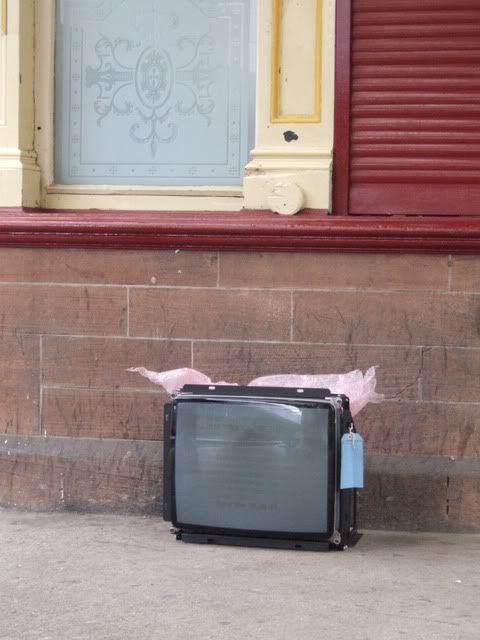And what would be the easiest way of imposing this new tax? Well get your ISP to collect an extra £15 a month on top of your broadband charges and watch your mobile phone bill jump up by a similar amount. Pay up like a good little docile rabbit for the BBC. You know it makes sense to keep them in £3 billion (yes BILLION) a year for kwality programmes like Animal Hospital Live and it keeps Jonathan Ross out of the dole queue and in sharp suits.
From
http://business.timesonline.co.uk/tol/b ... 417851.ece
Computer tax set to replace TV licence fee By Adam Sherwin and Dan Sabbagh
THE BBC licence fee should be replaced by a tax on the ownership of a personal computer instead of a television, ministers said yesterday. Tessa Jowell told the BBC that the licence fee would be retained for at least another ten years until 2017 in return for abolishing the Board of Governors. But the Culture Secretary conceded that technological advances would mean that a fee based on “television ownership could become redundant”. More than six million households have access to high-speed broadband connections and the BBC has begun experimenting with broadcasting video clips over the internet.
A legal loophole highlighted by the communications regulator Ofcom means that viewers could watch television and listen to radio over the internet and mobile devices free, potentially costing the BBC millions of pounds in licence fees.
The Department for Culture, Media and Sport’s Green Paper setting out the BBC’s long-term future proposed a solution that could end the traditional fee.The paper suggested “either a compulsory levy on all households or even on ownership of PCs as well as TVs”. It said that technology might render it difficult to collect and enforce the fee.
Related Links
Officially, the Government says that changes would not be needed until 2017, when the next BBC royal charter expires. A spokeswoman for the Department for Culture said that it was not worried for now, but insiders said that the department would act if internet viewing took off.
Over the next few years, internet broadcasting is set to increase rapidly as the quality of the images improves. The BBC already broadcasts all its radio stations over the internet, and began broadcasting live coverage of the Olympic Games last summer. The BBC has promised further internet broadcasts and is launching a hand-held viewing device. Ofcom predicts that more than half of Britain’s households will be watching television over the internet by 2012. Other emerging technologies will allow television to be broadcast direct to mobile phones. The mobile phone company O2 is planning trials this year, with the aim of a commercial service by 2007. The publication of the paper was accompanied by a warning from Ms Jowell, who said that the BBC must give higher priority to public-interest programming, and not chase “ratings for rating’s sake”. The BBC welcomed the reforms, which were widely interpreted as a victory for the Chairman Michael Grade, who said that he was “happy to sign up”, but was “slightly regretful” that the governors would be split in two.
From
http://www.theregister.co.uk/2005/03/03/pc_tax/
Digital Britain 'greatest ever challenge' for BBC, says minister By John Leyden
The BBC licence fee could eventually be replaced by a tax on having a PC instead of owning a TV, according to a Green Paper delivered this week. The government plans to retain the license fee for at least ten years but ministers are looking ahead to a time when high-speed broadband connections routinely deliver digital television channels to the nation's homes. In that event a fee based on television ownership could become redundant and the government could look at other ways to raise revenue, from subscriptions to taxing other access devices.
In a statement to Parliament this week, Culture Secretary Tessa Jowell said that "the changes in TV technology that will soon result in a wholly digital Britain... perhaps the greatest challenge the BBC has ever faced." The Times reports that a legal loophole means consumers could watch television or listen to radio over the net without having to pay a license fee, leaving the BBC with a funding shortfall that could run into the millions.
A Department for Culture, Media and Sport Green Paper on the BBC's long-term future proposes an end of the traditional license fee and "either a compulsory levy on all households or even on ownership of PCs as well as TVs". It cautions that these fees might be tough to enforce. Ministers are also consulting about the possibility of introducing a subscription model.
The Government reckons changes to the license fee will not be needed until 2017, when the BBC's next royal charter expires. However unnamed sources at the Department for Culture told The Times that the government would act earlier if viewing TV on the net became a hit with consumers. In August 2004, the BBC broadcast video clips from the Olympic Games over the net as an experiment. Six million UK homes currently have broadband connections, a figure that can only grow over time, spurring demand for innovative service like broadcasting over the internet. The majority of UK households will be watching TV over the internet by 2012, regulator Ofcom predicts.
